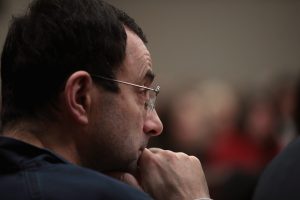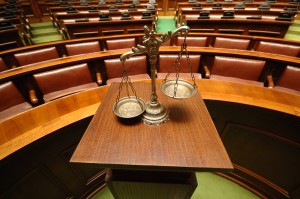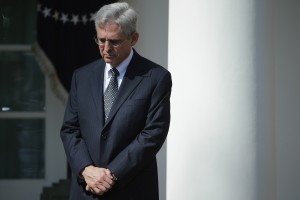Sentencing Law
-
 White-Collar Crime
White-Collar CrimeWhen Investigators Do Too Little And Judges Do Too Much: Some Thoughts On Larry Nassar
Even a monster like Larry Nassar deserved better than this. -
 Sentencing Law, Videos
Sentencing Law, VideosLawyers Are Getting Their Clients' Sentences Reduced By Showing Judges Short Documentaries
But are these films turning courts of law into theaters of law?  Sponsored
SponsoredEarly Adopters Of Legal AI Gaining Competitive Edge In Marketplace
How to best leverage generative AI as an early adopter with ethical use.-
 White-Collar Crime
White-Collar CrimeLiberal Prosecutors, Pious Shibboleths, And What Really Matters In Criminal Justice Reform
Democratic prosecutors don't necessarily practice what they preach.
-
 Crime, Sentencing Law
Crime, Sentencing LawThe Crapshoot Of Sentencing Laws
Need an example of the absurdity of our sentencing laws? A woman with stage IV breast cancer was recently sentenced to 75 years in jail. -
 Prisons, Sentencing Law
Prisons, Sentencing LawPrison Snips Sentences If Inmates Snip... (Yes, We're Talking About Vasectomies)
If you're wondering what your reproductive capacity is worth in America, it's about 30 days. -
 Department of Justice, Federal Judges
Department of Justice, Federal JudgesJudge Speaks Out About DOJ Injustices
The DOJ isn't budging on mandatory minimums and one district judge explains why that's troubling. -
 Crime, Sentencing Law
Crime, Sentencing LawThe Ultimate Stupidity Of Mandatory Sentencing
The only industry that will benefit from this cookie-cutter, throw-back approach is the prison industry. -
 Morning Docket
Morning DocketMorning Docket: 05.10.17
* Former FBI Director James Comey found out that he’d been fired in the worst way possible. He apparently saw the news of his sudden termination on television, and originally thought that it was some sort of a prank being played on him. When you get fired and everyone in the world knows about it before you do, that takes trolling to a whole new level. Ice cold. [New York Daily News]
* In other news, with Comey out of the way, President Donald Trump really wants to drill home the
alternativefact that he has no connections to Russia. According to White House press secretary Sean Spicer, Trump hired a “leading law firm in Washington, D.C.” to send a letter to that effect to Senator Lindsey Graham. Which “leading law firm in Washington, D.C.” could it be? [NBC News]* The Law School Admissions Council has named Dean Kellye Y. Testy of the University of Washington School of Law as its new president and CEO. Testy will step down from her current position to take the lead on several new initiatives at LSAC, including increasing the frequency of when the LSAT is administered and offering free online prep materials for the exam. Congratulations! [ABA Journal]
* “[W]e are reviewing all Department of Justice policies to focus on keeping Americans safe and will be issuing further guidance and support to our prosecutors executing this priority.” Attorney General Jeff Sessions seems interested in reinstating harsh punishments for low-level drug crimes, up to and including severe mandatory minimum sentences. [Washington Post]
* Andrew Luger was once the U.S. Attorney for Minnesota, but in March, AG Jeff Sessions demanded that as an Obama-era holdover, he resign from his position. A few months have passed, and now Luger will actually have an opportunity to work intimately with the Trump administration. He’s now a member of the partnership at a firm with close ties to the president: Jones Day. [Am Law Daily]
* Travel bans, and SCOTUS appointments, and executive powers, oh my! Donald Trump’s first 100 days in office were filled with such legal lunacy that professors at the Cardozo School of Law were inspired to create a 10-week course on Trumpism and the rule of law. Were they worried that the president would stop providing for material for them to work with? No, absolutely not. [HuffPost]
 Sponsored
SponsoredIs The Future Of Law Distributed? Lessons From The Tech Adoption Curve
The rise of remote work has dramatically reshaped the relationship between Lawyers and Law Firms, see how Scale LLP has taken the steps to get…-
 Morning Docket
Morning DocketMorning Docket: 04.19.17
* Did anyone really expect Biglaw associates to jump ship so quickly for in-house jobs after the huge raises they got this past summer? According to Michelle Fivel of Major Lindsey & Africa, these days, associates “have increased standards for what they’re willing to throw their hat into the ring for, mostly based around compensation.” [Law360 (sub. req.)]
* “This is so important to us from an income point of view.” Thanks to President Donald Trump’s “America First” immigration policies, law schools are worrying about whether their cash-cow LL.M. programs will suffer. These programs typically bring in about $350 million each year, so this is definitely something worthy of concern. [Legal Intelligencer]
* Texas law school graduates from the class of 2016 performed better in the job market than their classmates who graduated just one year prior. This data comes from the latest employment information gathered by the American Bar Association, which we imagine will be made public soon. How do you think your law school did? [Houston Chronicle]
* “I was honored to be the chair, but there is no requirement for one in the partnership agreement.” Tony Valukas has stepped down as the chair of Jenner & Block, and he doubts anyone will replace him since his title was honorary in nature. [Big Law Business]
* Pedro Hernandez, the man who murdered Etan Patz — the first child to appear on the side of a milk carton — has been sentenced to 25 years to life in prison. [Reuters]
-
 White-Collar Crime
White-Collar CrimeWhen A Little Gets More And More: Prosecutors And Prison Time
What are we really accomplishing? -
 Sentencing Law, Supreme Court
Sentencing Law, Supreme CourtSCOTUS Plays Hell With Congressional Intent In Mandatory Minimums Case
Most people don't trust lawyers and courts. This is why. -
 Death Penalty
Death PenaltyDylann Roof's Death Sentence Is A Tragedy... For A Lot Of Other People
It's impossible to sympathize with Dylann Roof, but consider the fallout of this sentence. -
 Morning Docket
Morning DocketMorning Docket: 01.04.17
* “Judge Garland is respected on both sides of the aisle. That he did not even get so much as a hearing will be a stain on the legacy of the Republican Senate.” After languishing for a total of 293 days, D.C. Circuit Judge Merrick Garland’s nomination to the Supreme Court officially expired yesterday at noon with the formal adjournment of the 114th Congress. [Wall Street Journal]
* Following eight years at the helm of one of the most prestigious schools in the county, Dean Martha Minow of Harvard Law will be stepping down from her position at the end of the academic year. Minow plans to return to teaching a full course load this summer, and according to inside sources at the school, a search for her successor will begin “soon.” We’ll have more on this news development later today. [Harvard Crimson]
* Judge William Pryor (11th Cir.) was named acting chair of the U.S. Sentencing Commission. Pryor, who is under consideration to be President-elect Trump’s SCOTUS nominee, says he looks forward to “developing federal sentencing policies that further the goals of the Sentencing Reform Act of 1984.” [U.S. Sentencing Commission]
* President-elect Trump has chosen Skadden Arps partner Robert Lighthizer as U.S. trade representative. Lighthizer served as deputy U.S. trade representative in the Reagan administration, and Trump believes he “will do an amazing job helping turn around the failed trade policies which have robbed so many Americans of prosperity.” [USA Today]
* As days go by without word of a resolution as to the school’s federal loan issues, lawsuits continue to pile up against the Charlotte Law. Students now claim the school has sentenced them “to years of indentured servitude” by saddling them “with crushing, non-dischargeable debt that will take literally decades to pay off.” [Charlotte Observer]
Sponsored

Early Adopters Of Legal AI Gaining Competitive Edge In Marketplace

Navigating Financial Success by Avoiding Common Pitfalls and Maximizing Firm Performance

Is The Future Of Law Distributed? Lessons From The Tech Adoption Curve
Sponsored

The Business Case For AI At Your Law Firm


Legal AI: 3 Steps Law Firms Should Take Now
-
 Pro Bono, Public Interest
Pro Bono, Public InterestFor Giving Families Hope During The Holidays, Brittany Byrd Is My Inspirational Attorney Of The Year
It's high time to question our current system and government sentencing policies. -

-
 Sentencing Law, White-Collar Crime
Sentencing Law, White-Collar CrimeThe Challenges Of White-Collar Sentencing
Balance is critical in making your case at sentencing. -
 Morning Docket
Morning DocketMorning Docket: 11.07.16
* There are many questions, but no answers, as Judge Merrick Garland’s “final reckoning” approaches. His nomination will die if Republican presidential candidate Donald Trump is elected, but would he be confirmed in a lame-duck session if Democratic presidential candidate Hillary Clinton wins? In that case, if Senate Republicans refuse to confirm him after the election, will Clinton re-nominate him after she’s sworn in? Will he ever receive a hearing? Someone please help this poor man. [Reuters]
* With apologies to Judge Garland, the only thing that seems to remain certain is that Senate Republicans are firm in their stance that they’ll continue to prevent the late Justice Antonin Scalia’s seat on the Supreme Court from being filled. Senator John McCain, for example, asked supporters to re-elect him so he can assist his GOP brethren in “prevent[ing] that four-to-four split from tilting to the left.” [Huffington Post]
* According to FBI director James Comey, after review of additional emails found in an unrelated investigation into Anthony Weiner, there’s still no evidence that Hillary Clinton should face any criminal charges over the handling of her email communications while she was Secretary of State. Voters can breathe a little easier now, because there will be no indictments coming for the Democratic presidential nominee. [New York Times]
* Chadbourne & Parke has finally responded to partner Kerrie Campbell’s $100M gender discrimination suit, and the firm didn’t pull any punches, alleging that her practice area was a “poor fit” for the firm, that she “exhibited questionable legal judgment,” and that its decision to ask her to leave was for “entirely legitimate and proper business reasons and without a scintilla of consideration being given to her gender.” [WSJ Law Blog]
* “No purpose will be served by letting him rot in prison for years on end.” Judge Jed Rakoff, a longtime critic of federal sentencing guidelines, has sentenced Harvard Law School graduate-cum-Ponzi schemer Andrew Caspersen to four years in prison for his $38.5M fraud, even though prosecutors sought almost 16 years of time behind bars for his financial crimes — a proposition which Rakoff referred to as “absurd.” [Reuters]
* E. Barrett Prettyman Jr., founder of the first appellate practice, RIP. [Hogan Lovells]
* Janet Reno, first woman to serve as U.S. attorney general, RIP. [New York Times]
-
 Morning Docket
Morning DocketMorning Docket: 10.06.16
* Rudy Giuliani will be taking a “voluntary leave of absence” from Greenberg Traurig thanks to his activities related to Donald Trump’s campaign for the presidency. Is Giuliani’s move truly voluntary, or was the prominent partner forced to take a break as Election 2016 draws closer and the race for the White House becomes even more heated? We’ll have more on this development later today. [Observer]
* In 196 deals with a total volume of $379.6 billion, White & Case is ranked No. 1 on Bloomberg’s M&A charts for global deals in the first three quarters of 2016. The firm surpassed the likes of SullCrom (No. 2), Wachtell Lipton (No. 3), Davis Polk (No. 4), and Skadden (No. 5). This time last year, Skadden was leading the pack. [Big Law Business]
* In one of the first cases related to race that SCOTUS grappled with this Term, some say it appeared as though the justices may side with a black death row inmate in search of a new sentence because his own lawyer used an expert witness at trial who testified that the man was more likely to be dangerous in the future because of his race. [Reuters]
* Government lawyers continue to flock to Biglaw firms, and this time, the lateral hire is a “true patriot, who believes in service to the nation as a calling.” WilmerHale welcomes Alejandro Mayorkas, a former U.S. Attorney who has worked for the the past three years as No. 2 at the Department of Homeland Security. Congratulations! [WSJ Law Blog]
* “I just hope that when people think the rules don’t apply to them, they will think twice before they abuse their power.” Thanks to a California law signed by Gov. Jerry Brown, it is now a felony punishable by up to three years in prison for state prosecutors to tamper with evidence or hide exculpatory material from the defense. [Los Angeles Times]
-
 Sentencing Law, Sports
Sentencing Law, SportsFootball Is A Matter Of Life And Limb In The South
When teams lose, children go to jail. It should be a national embarrassment. -
 White-Collar Crime
White-Collar CrimeShould We Respect A Law No One Follows?
No one really thinks you should drive the speed limit. But what does that mean for the law?